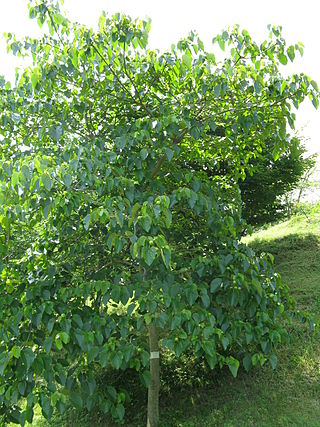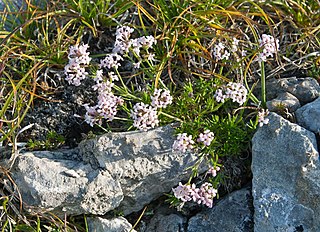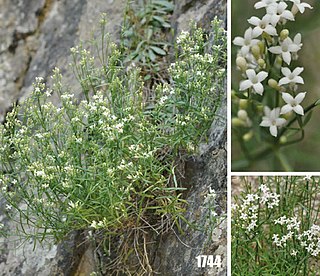
Vernicia fordii is a species of flowering plant in the spurge family Euphorbiaceae. It is native to southern China, Myanmar, and northern Vietnam. It is a small to medium-sized deciduous tree growing to 20 m tall, with a spreading crown. The bark is smooth and thin, and bleeds latex if cut. The leaves are alternate, simple, 4.5–25 cm long and 3.5–22 cm broad, heart-shaped or with three shallow, maple-like lobes, green above and below, red conspicuous glands at the base of the leaf, and with a 5.5–26 cm long petiole. The flowers are 2.5–3.5 cm diameter, with five pale pink to purple petals with streaks of darker red or purple in the throat; it is monoecious with individual flowers either male or female, but produced together in the inflorescences. The flowers appear before or with the leaves in loose, terminal clusters. The fruit is a hard, woody pear-shaped berry 4–6 cm long and 3–5 cm diameter, containing four or five large, oily seeds; it is green initially, becoming dull brown when ripe in autumn.

Antidesma is a genus of tropical plant in the family Phyllanthaceae formally described by Linnaeus in 1753. It is native to tropical Africa, S + E + SE Asia, Australia, and various oceanic islands. The greatest diversity occurs in Southeast Asia.

Skimmia is a genus of four species of evergreen dioecious shrubs and small trees in the rue family Rutaceae, all native to warm temperate regions of Asia. The leaves are clustered at the ends of the shoots, simple, lanceolate, 6–21 cm long and 2–5 cm broad, with a smooth margin. The flowers are in dense panicle clusters, each flower small, 6–15 mm diameter, with 4-7 petals. The fruit is red to black, 6–12 mm diameter, a fleshy drupe containing a single seed. All parts of the plant have a pungent aroma when crushed. The botanical name Skimmia is a Latinization of shikimi, which is the Japanese name for Illicium religiosum as well as an element in miyama shikimi, the Japanese name for Skimmia japonica.

Asperula, commonly known as woodruff, is a genus of flowering plants in the family Rubiaceae. It contains 91 species and has a wide distribution area from Europe, northern Africa, temperate and subtropical Asia to Australasia.

Asperula gunnii, the mountain woodruff, is a species of flowering plant in the family Rubiaceae. It is a perennial herb that is endemic to Australia.

Persoonia asperula, commonly known as mountain geebung, is a plant in the family Proteaceae and is endemic to south-eastern Australia. It is an erect or prostrate shrub with smooth bark, mostly elliptic to oblong leaves and yellow flowers borne singly or in groups of up to nine. It mostly occurs in the Southern Highlands of New South Wales. A small population in Victoria may be a different species.

Asperula conferta is a species of flowering plant in the family Rubiaceae. It is Australian endemic distributed across Queensland, New South Wales, Victoria, Tasmania, South Australia and the Northern Territory.
Asperula crassula is a species of flowering plant in the family Rubiaceae, endemic to a few hundred hectares in northeast Crete. It was first described in 1857.
Asperula subulifolia is a species of flowering plant in the family Rubiaceae. It was first described in 1928 and is endemic to Australia.
Asperula tetraphylla is a species of flowering plant in the family Rubiaceae. It was first described in 2009 and is endemic to South Australia.
Asperula wimmeriana is a species of flowering plant in the family Rubiaceae. It was first described in 1928 and is endemic to south east Australia.
Cynanchica abbreviata, commonly known as woodruff, is a species of flowering plant in the family Rubiaceae that is endemic to Naxos and Amorgos in Greece. It was first formally described in 1901 by Eugen von Halácsy who gave it the name Asperula lutea var. abbreviata in Conspectus Florae Graecae. In 1943, Karl Heinz Rechinger raised the variety to species status as Asperula abbreviata in Denkschriften der Kaiserlichen Akademie der Wissenschaften / Mathematisch-Naturwissenschaftliche Classe. In 2020, it was reclassified into the newly erected genus Cynanchica.

Cynanchica abchasica, commonly known as woodruff, is a deciduous species of perennial groundcover, and a flowering plant in the family Rubiaceae. It is endemic to Transcaucasus, and was first named by V.I Krecz. In 2020, it was reclassified into the newly erected genus Cynanchica.
Cynanchica accrescens, commonly known as woodruff, is a deciduous species of perennial groundcover, and a flowering plant in the family Rubiaceae. It is endemic to Transcaucasus and was first named by Klokov.
Asperula acuminata is a deciduous species of perennial groundcover, and a flowering plant in the family Rubiaceae, known as Woodruff, and is endemic to NE. New South Wales of Australia, and was first named by I.Thomps.

Asperula albiflora is a deciduous species of perennial groundcover, and a flowering plant in the family Rubiaceae, known as Woodruff, and is endemic to Turkmenistan, and was first named by Popov.
Asperula apuana is a deciduous species of perennial groundcover, and a flowering plant in the family Rubiaceae, known as Woodruff, and is endemic to Italy, and was first named by (Fiori) Arrigoni.
Asperula assamica is a deciduous species of perennial groundcover, and a flowering plant in the family Rubiaceae, known as Woodruff, and is endemic to Assam, East Himalayas, and was first named by Meisn.
Asperula asterocephala is a deciduous species of perennial groundcover, and a flowering plant in the family Rubiaceae, known as Woodruff, and is endemic to Iraq, and was first named by Bornm.

Cleistanthus hylandii, commonly known as Bernie's Cleistanthus, is an evergreen plant in the family Phyllanthaceae which is endemic to Cape York Peninsula in far northern Queensland, Australia.









